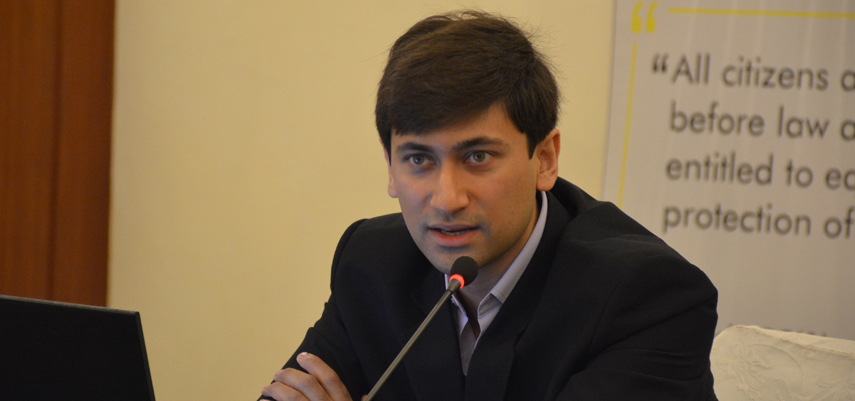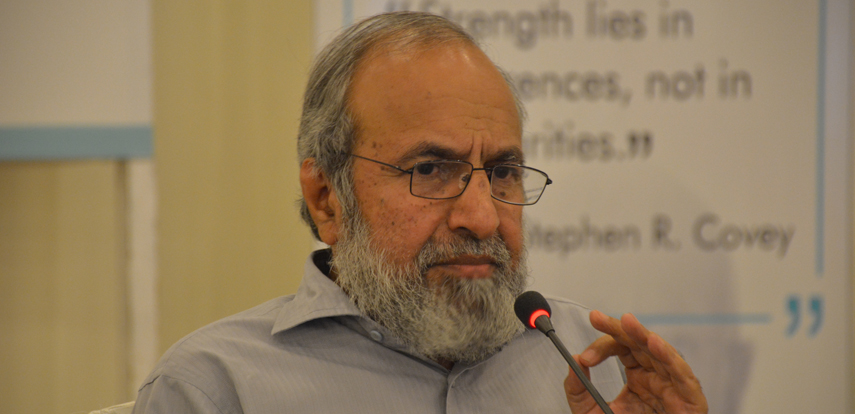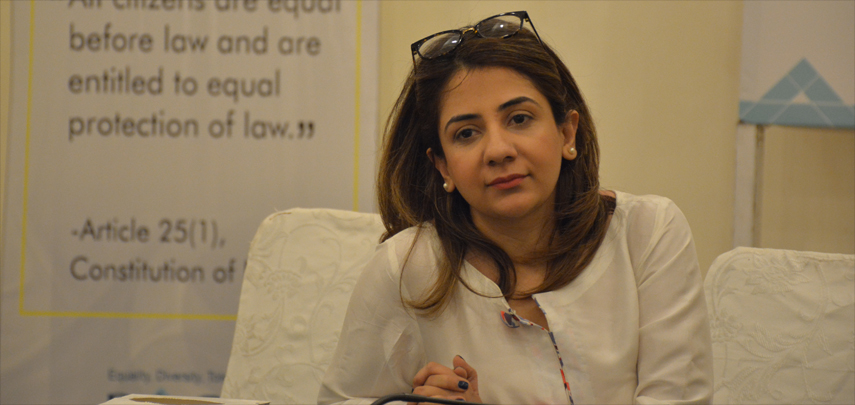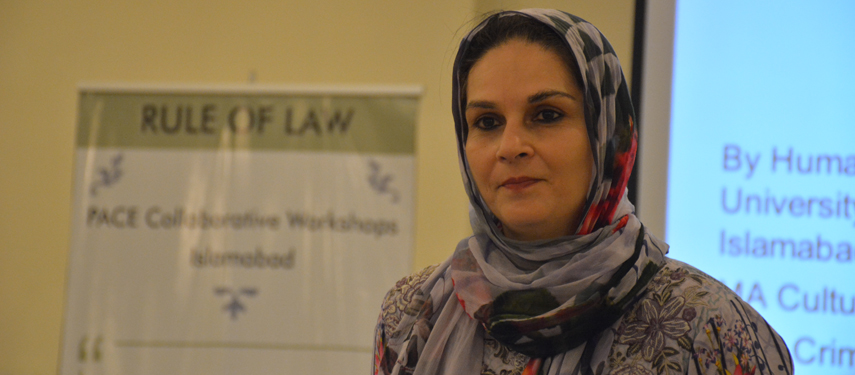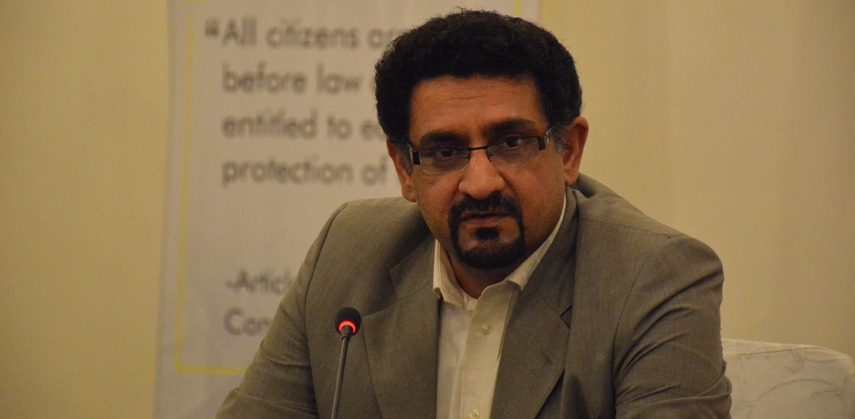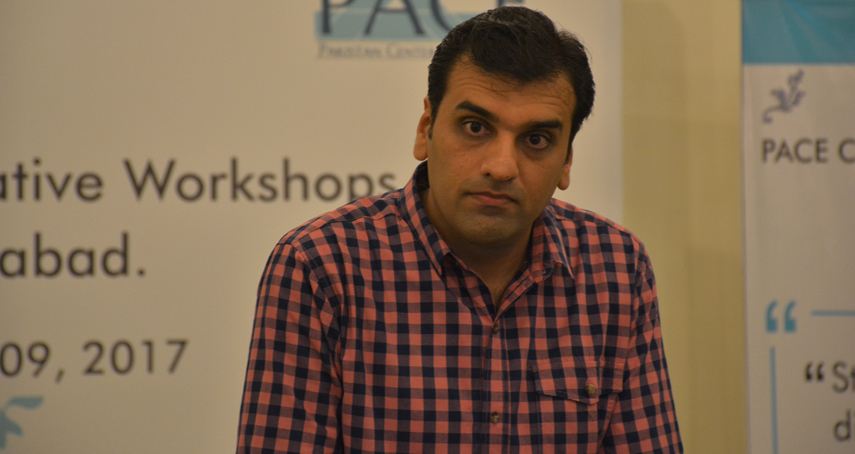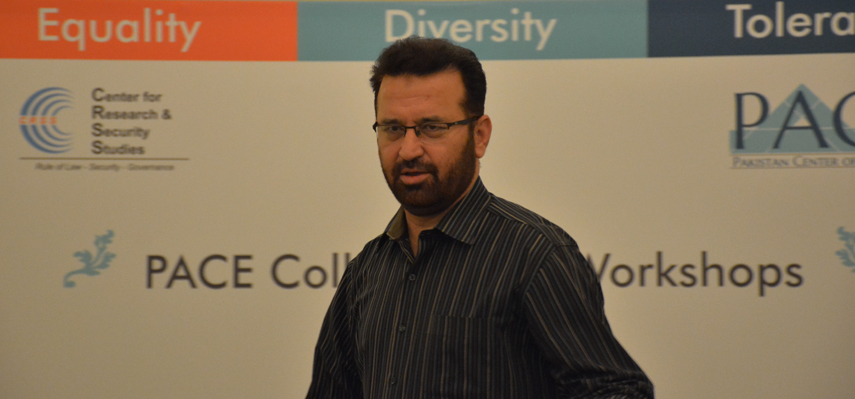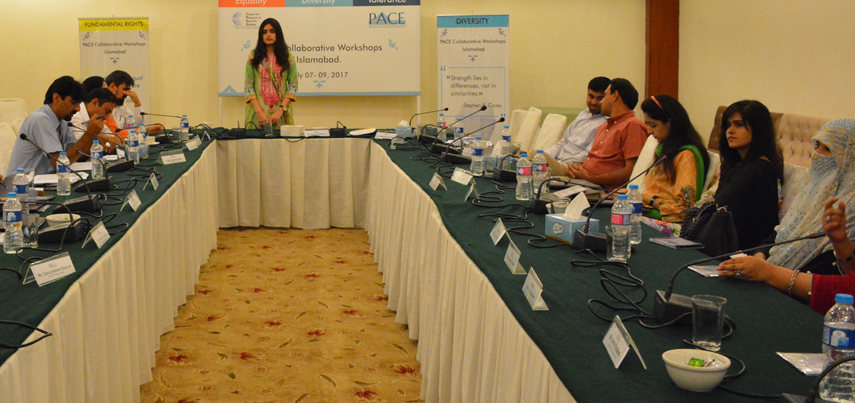The Center for Research and Security Studies (CRSS) conducted the 18th three-day PACE Collaborative workshop for young university lecturers and professors from July 7 – 9, 2017, at Hill View Hotel, Islamabad. The workshop was conducted under the umbrella of the Pakistan Center of Excellence (PACE), a counter-radicalization, pluralistic values focused project, in collaboration with the Dutch Government.
Participants included young university lecturers and professors from University of Sargodha, Sargodha, Sindh Agricultural University, Tando Jam, FATA University, FR Kohat, University of Science and Technology, Bannu, University of Peshawar, Peshawar, University of Kotli, Azad Jammu and Kashmir, Kotli, and Preston University, Islamabad.
Opening Ceremony
Mr. Mustafa Malick, Manager Programs and Research Fellow at CRSS, welcomed participants to the workshop, saying that PACE is put together by CRSS to counter radicalization, inculcate critical thinking, question preconceived notions and narratives, and embed the national discourse in constitution and the rule of law. He said that PACE is grounded in the universal values of tolerance and acceptance; tolerance is one virtue that leads to a range of other factors such as perseverance, coexistence and the idea of peace building. He elaborated that adherence to rule of law, respect for diversity, opinions and rights, and ideas of perseverance, coexistence, peace building and tolerance can be inculcated in the minds of the youth only by the teachers ; the gate keepers of the future. He shared rules and regulations of the workshop with participants.
Workshop Core Areas
The young professionals were trained in following areas:
- Leadership and motivation
- Equal citizenry and respect for rule of law
- Fundamentals of democracy, governance and accountability
- Respect for diversity, opinions and rights
- Rights of minorities and other marginalized groups
- Constitutionalism, and adherence to Pakistan’s Constitution, particularly articles 8-28
- The importance of asking critical questions in the pursuit of knowledge
Workshop Modules
The cadre of young lecturers was trained by the experts in the above mentioned fields including: Dr. Khalid Zaheer, Ms. Sehar Tariq, Ms. Humaira Masihuddin, Dr. Zubair Ghouri, Mr. Ammad Khaliq and Mr. Safiullah Gul.
Dr. Khalid Zaheer kicked off first session of the day and spoke on the topic of religious intolerance. “Religious tolerance is the right one should give to others to believe in and practice faith of their choice. We can’t impose our views on others and we can’t blame others for their beliefs and ideas. You can’t respect a view despite of strongly disagreeing with it but you can show tolerance towards it. When we say, we allow other to have religious freedom and we can’t impose our point on others genuinely, that is called religious tolerance. We have no right to impose our beliefs on others. Our attitude toward other’s beliefs should be genuine and positive. People usually believe in and practice ideas and beliefs what they have learnt from their elders or what they have been convinced by. Islam teaches us not to use abusive language for other religions or faiths and respect them. If Islam says so; then why some Muslims are intolerant? There are a few arguments in front of them that are making them violent and intolerant. There is also a restrained religious setting who cut people off the society and there is always confinement in communication. Questioning is not allowed in such environments and they make you blindly follow the ones who lead such groups. We need to get rid of such environments, groups and thinking that are leading us to extremism and religiously intolerant society. We should not be violent towards the people who are not of same belief what we believe in. Everyone has right to do whatever they want and believe. Being humans, we expect others to tolerate us; same is what they expect from us,” he explained.
Ms. Sehar Tariq was the second speaker of the day and spoke on the “Tolerance for diversity”. Ms. Tariq started her session with a brainstorming activity and asked participants about their perceptions on various generalized societal concepts. She later on discussed their responses in detail. She talked about how certain characteristics are specifically related to a gender, religions, sects, cultures, ethnicity, just because of the stereotyping. Stereotyping is something that is deeply rooted in our society. People judge each other on the basis these stereotypical behaviors. There is no respect for differences and because of this disrespect we consequently end up indulging in violent activities. We live in a society where we can find cultural, political and religious, ethnic and social diversity. Despite of living in this diverse society, we never tolerate or celebrate these differences in a positive manner. Instead, we try to manipulate and exploit each other. Stereotyping is an easy way of organizing and processing information.
She further said that we are all humans and, by virtue of that, we are equal citizens. Constitution is the supreme law of the land and it guarantees equal rights to all of its citizens and tells us about our fundamental rights. Law should deal with all citizens as equals irrespective of any discrimination on the basis of sex, religion, creed, cast or social status.
Ms. Tariq, while concluding the session said that tolerance for diversity is the dire need of our time. We need to respect the differences that we have between us. We need to find out how many commonalities we share and work hard to create a society that is more tolerant and respectful towards differences.
Ms. Humaira Masihuddin on “Multiculturalism and pluralism with reference to Islam” started the first session of the second day. She said that human beings belong to one origin and one place and no purely homogeneous society exists in the modern world. Most societies consist of different ethnic groups. She defined minorities as a group of people who are singled out from the other groups and are treated differently because of their physical or cultural characteristics. Minority is a subordinate group as opposed to the dominant group.
The concept of multiculturalism revolves around a society with heterogeneous beliefs and set of ideas. Multiculturalism makes a society diverse. Respect for diversity shapes coexistence, peace, and harmony under a political and institutional framework. Differences are not challenges and do not impose any limitation on growth of an individual or society. Every individual has a right to be different and be respected by all. In Islam, the concept of diversity is clearly inclusive, she continued. In the Quran, she said, humans are addressed to treat one another without any discrimination and respect each other’s beliefs and should never use abusive language or show disrespect towards others. If we look at the character of the Holy Prophet (PBUH), it is evident how He always respected the non-Muslims in Mekkah and Medina. Even on the day Mekkah was conquered by Muslims, Prophet (PBUH) forgave all His enemies for the harms that they had inflicted on Him. Ms. Humaira also made note of the last sermon of the Holy Prophet that said “All mankind is from Adam and Eve, an Arab has no superiority over a non-Arab nor a non-Arab has any superiority over an Arab; also a white has no superiority over black nor a black has any superiority over white except by piety (taqwa) and good action.” In short, Islam is the religion of tolerance and coexistence, love and peace for others regardless of their religion or ethnicity.
Dr. Zubair Ghouri kicked off the second session of the day on the topic of “respect for diversity, rights and opinions”. He said that as citizens of Islamic Republic of Pakistan, whenever we talk about humanity and humanitarian affairs, we are closely linked with the Islamic concept of human rights and equality. The constitution of Pakistan guarantees equal rights to all the citizens but the preamble restricts equal citizenry by defining the concept of divine sovereignty. But there are a few minority groups who don’t believe in divine sovereignty and on the basis of their beliefs we deprive them of the concept of equal citizenry.
Mr. Ammad Khalique kicked off his session on “Media & Ethics”. He started with the definition of “Media” and “Ethics”, media is the collective communication outlet or tool that is used to store and deliver information or data. Specialized mass media channels include print media, social/digital media, photography, advertising, cinema, and broadcasting (Radio, TV). Speaking on the freedom of expression, he referred to Article 19 of the UN Charter, “Everyone has the right to freedom of opinion and expression; this right includes freedom to hold opinions without interference and to seek, receive and impart information and ideas through any media and regardless of frontiers.”
He defined ethics as the way people behave based on their beliefs about what is right and wrong and how it influences their behaviors and values. He shared his views on ethics in journalism with following points:
- Seek truth and report it
- Minimize harm
- Act independently
- Maintain standards of decency
- Be accountable
He also said that being neutral and presenting authentic news is one of the values that should be kept in mind while reporting certain issues. Media is bound in some cases and cannot be open and expose the facts. He said that words are sometimes misinterpreted and other times twisted when reporting sensitive issues; therefore, extreme care should be taken while debating on such issues. He stressed that the reporters while broadcasting should use decent language.
He shared few laws and ethics that are binding upon media:
- Cyber Stalking
- Cyber Bullying
- Cyber Masking
- Cyber Frauds
- Hate Speech
- Defamation
- Intrusion to Privacy
- Harassment
- Cyber Crime Bill 2016
- Cyber Wing (FIA)
Mr. Safiullah Gul was the first speaker of the last day and spoke on the topic of “leadership and motivation”. He emphasized the extent to which effort is directed towards a goal, and its components: activation, persistence and intensity.
He elaborated the phrase that he who fails to plan actually plans to fail and shared a story of a man who alone changed the course of history with motivation and persistence despite of all the opposition from the society. Being alone doesn’t matter if you are determined to achieve your goals and objectives. You only have to overcome the fears and insecurities to move towards the achievement of your goals. An individual sometimes can set an example and become motivation for others.
His session, filled with activities to enhance creative and critical thinking, focused on looking at things from a slightly different perspective to encourage problem-solving.
Ms. Zehra Zaidi, Project Coordinator PACE, in her concluding remarks, insisted that there is a dire need to revisit the widespread preconceived notions that have been passed through our cultural values in the society over generations. Teachers, with the responsibility of imparting values to the young generation in educational institutions, are the most valuable engines that can challenge common negative narratives that promote hatred and bigotry. She said that teachers have the ability to shape an entire generation’s mindset to propagate tolerance, diversity and equality.
She shared that participants need to conduct these activities with their students to inculcate adherence to the rule of law and equal citizenry. CRSS provides financial and logistic support in this regard to lecturers and professors so that they can foster the universal ideals of tolerance and diversity in the young generations.

